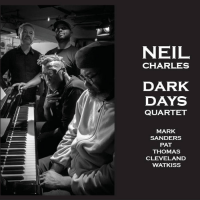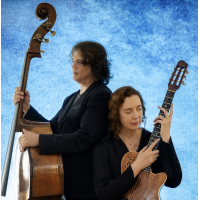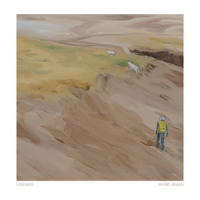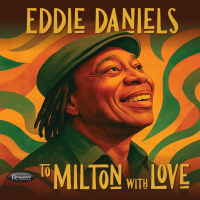Home » Jazz Articles » Album Review » Neil Charles Quartet: Dark Days
Neil Charles Quartet: Dark Days
It takes all of us—and that includes musicians, especially musicians. Composer and drummer Max Roach understood this, as did John Coltrane. Roach's We Insist! / Freedom Now Suite (Candid, 1961) remains one of the most uncompromising musical statements against racism, matched in power and focus by Coltrane's elegiac "Alabama." A quarter century into the new millennium, bassist-composer Neil Charles has taken up that mantle. To mark the centenary of author and civil rights activist James Baldwin's birth in 2024, Charles created Dark Days, a live performance captured at London's Café Oto. His quartet—Charles on bass, Pat Thomas on piano, Mark Sanders on drums and Cleveland Watkiss on vocals—had already forged chemistry in Iraq-born vocalist Alya Al-Sultani's ensemble Collective X, most notably on Love & Protest (Two Rivers Records, 2018).
Rather than simply reciting Baldwin's Dark Days essays, Charles distills them into potent fragments, letting emotion flow through both the instruments and Watkiss's voice. Watkiss does far more than sing: he speaks, shouts, gargles, mumbles, screams and scats Baldwin's words, wringing every drop of urgency from them. In "I Knew It," his delivery makes palpable the loss of innocence Baldwin experienced in Jim Crow America. The repeated line "Why Do We Hate?" becomes less a question than an existential reckoning, a Socratic challenge. Behind him, the band surges with its own fury: Charles as a modern-day Charles Mingus, Thomas channeling the restless angles of Thelonious Monk, Sanders bridging the swing precision of Kenny Clarke with the freeform fire of Milford Graves. The blues-drenched "They Do Not See" recalls Mingus' "Freedom," capped by a muscular, unflinching bass solo from Charles.
"Army" opens with Watkiss's croon floating over Charles's bowed bass, gradually expanding as Thomas plucks and strums inside the piano and Sanders scrapes cymbals into a rustling crescendo. Watkiss layers his voice into a choral swell via live electronic loops, creating a sound both intimate and vast. In "Treason," the lyric "we wish to be citizens" is first spoken plainly, then sung operatically—its repetition sharpening the absurdity of such a plea needing to be made at all. Sanders's acrobatic drum solo propels the music into "A Nation," where Thomas's piano gymnastics fan the flames of protest into an almost theatrical climax.
The set closes with Baldwin's voice—through Watkiss—casting a wide net, urging not just Black Americans, but also Irish, Chinese, Jewish and all marginalized peoples to "Find a Way" to preserve hope and claim their rightful place. It is a reminder that the struggle for dignity is global, and that faith in change is itself a revolutionary act.
Dark Days does not simply honor Baldwin; it extends his fight, translating his fierce clarity into a soundscape that is urgent, unflinching and impossible to ignore. In a time when history risks fading into abstraction, Charles and his collaborators make sure it still burns bright.
Track Listing
Dark Days; I Knew It; Why Do We Hate; They Do Not See; Dark Days Outro; Sing Or Shout; Children; Army; Treason; A Nation; Find A Way.
Personnel
Additional Instrumentation
Neil Charles : compositions; Mark Sanders: percussion: Cleveland Watkiss: loops.
Album information
Title: Dark Days | Year Released: 2025 | Record Label: Jazz Now
Tags
PREVIOUS / NEXT
Support All About Jazz
 All About Jazz has been a pillar of jazz since 1995, championing it as an art form and, more importantly, supporting the musicians who make it. Our enduring commitment has made "AAJ" one of the most culturally important websites of its kind, read by hundreds of thousands of fans, musicians and industry figures every month.
All About Jazz has been a pillar of jazz since 1995, championing it as an art form and, more importantly, supporting the musicians who make it. Our enduring commitment has made "AAJ" one of the most culturally important websites of its kind, read by hundreds of thousands of fans, musicians and industry figures every month.























